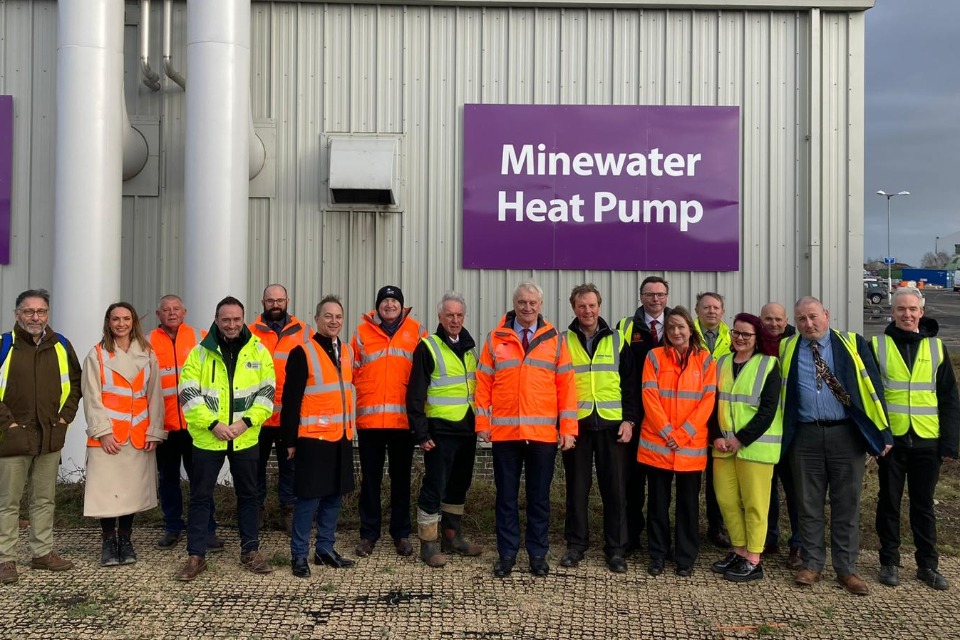The Minister of State for Energy Security and Net Zero has visited Gateshead to get a closer look at a groundbreaking energy project.
Today (24 January 2024) The Rt Hon Graham Stuart MP was in the town for a tour of the first large-scale mine water heat network in the UK, which is also one of the largest in Europe.
The Gateshead mine water heat network is a major milestone in decarbonising heat and a real-world example of how communities could benefit from using historical industrial mining infrastructure to create an eco-friendly future.
By tapping into the potential of water-filled, abandoned coal workings, this innovative project harnesses geothermal energy from mine water to generate localised secure, low-carbon heat, helping to combat climate change and supporting our transition towards a net-zero economy.
Mr Stuart said:
From coal, the dirtiest of fossil fuels, to clean heat - it was incredible to see first-hand how this pioneering project is using our nation's historic mining infrastructure to shape our clean energy future.
Mine water heat networks like this one could provide clean heat for families for decades to come, without having to pay for an additional fuel source - cutting emissions and keeping down bills on the path to net zero.

Minister for Energy Security and Net Zero, Graham Stuart, pictured with members of the Coal Authority, Gateshead Council and other key stakeholders
The visit by Mr Stuart highlights the government's commitment to net zero and the transformative potential of mine water heat schemes, which could contribute to clean energy targets while revitalising local economies.
Run by the council-owned Gateshead Energy Company, the project also demonstrates how similar networks could also benefit other coalfield communities across Great Britain.
The project is the result of a collaboration between public and private sectors, bringing together the expertise of key stakeholders, including government bodies, local authorities, and energy industry leaders.
Gateshead Council was awarded £5.9m of Heat Networks Investment Project (HNIP) funding to help install 5km of new heat network pipes, boreholes and an energy centre, enabling access to 6 mega-watts of mine water heat.
This now provides secure, low-carbon heating to 350 homes, Gateshead College, the Glasshouse (formerly Sage Gateshead), Gateshead College, the Baltic Centre for Contemporary Art and several office buildings.
A large manufacturing site was also added to the network a few months ago and there are plans for future additions to include 270 private homes, a new conference centre and a hotel development.
The scheme was supported throughout by the Coal Authority, which owns and manages the disused coal-mining infrastructure on behalf of the UK government.
The authority, along with key partners such as the British Geological Survey, has been researching the potential for recovering low-carbon heat from disused coal mining infrastructure for several years and built up a wealth of expertise during this time, which was used to advise and help facilitate the Gateshead project.
Another pioneering privately-funded mine water heat scheme at nearby Lanchester Wines, providing space heating to warehouses, demonstrates that mine water heat can also work for a range of industrial and business uses.
Councillor John McElroy, cabinet member for the environment and transport at Gateshead Council, said:
Our industrial legacy of flooded coal mining infrastructure is becoming an asset to provide low carbon power for our future.
Where we were leaders of the industrial revolution 200 years ago, now in Gateshead we have the opportunity to be a leader in the green energy revolution of today.
Utilising mine water in our heat network is a huge achievement on the journey to providing zero carbon heat.
We are showing what is possible when you invest in this technology.
Richard Bond, innovation and engagement director at the Coal Authority, said:
This event has been a great opportunity to showcase just what can be achieved by mine water heat.
It is now proven to be an innovative, sustainable solution that is providing a consistent source of secure, low carbon heat for homes and businesses in coalfield areas.
We are proud to have been part of this revolutionary step by working closely with Gateshead Council, who have taken the technology from concept to reality in around 3 years, trailblazing the way for other local authorities across the country.






